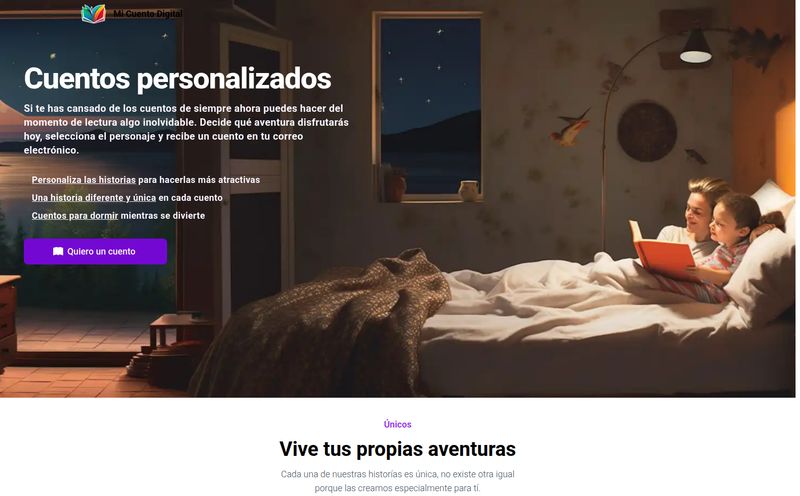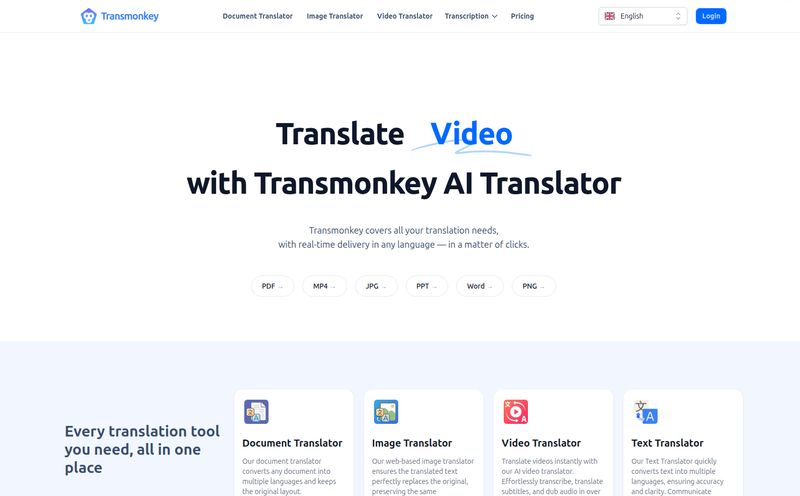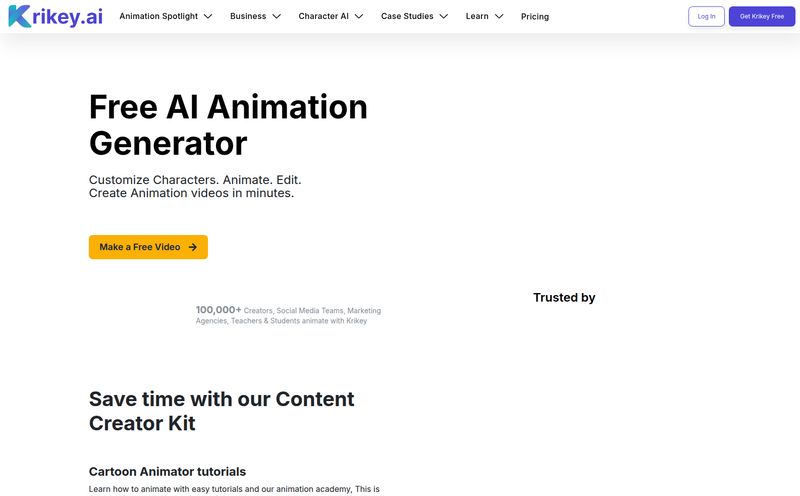As someone who’s been swimming in the digital marketing and SEO pool for years, I've seen countless AI tools pop up. They promise the world, from writing perfect ad copy to designing a website in seconds. And honestly? Some of them are pretty darn good. But every so often, a tool comes along that feels a little different. A little more... magical.
That was my first impression of Fabula. The pitch was simple, and for any parent, it was brilliant: an AI that creates custom, personalized stories for your kids. Complete with images and an audio narrator. I mean, come on. The idea of telling my niece a brand new story every night, one where she's the hero and her grumpy cat, Mittens, is the trusty sidekick? That's not just a cool tech gimmick; it's a core memory waiting to happen.
So, I decided to take a look. I fired up my browser, ready to generate a whimsical tale about a brave knight named Lily and her quest for the Golden Squeaky Toy. And I was met with... well, this.

Visit Fabula for Kids
A 404 error. A digital dead end. 'DEPLOYMENT_NOT_FOUND.' It’s the online equivalent of a “Sorry, we're closed” sign on a business that was supposed to be having its grand opening. So, this isn't going to be your typical review. Instead, it’s become a bit of a digital investigation into a great idea that seems to have become a ghost in the machine.
What Was the Fabula Dream?
Before we get all detective-y, let's talk about what Fabula was supposed to be. Based on the digital breadcrumbs it left behind, the platform was designed to be an incredibly intuitive storyteller. The whole concept was built on a foundation of personalization, aiming to take bedtime stories from a one-size-fits-all experience to something uniquely special for each child.
Making Your Kid the Star of the Show
The biggest selling point was the deep personalization. This wasn’t just Mad Libs-style word replacement. The goal was to weave your child’s name, details about their life, their friends, and even their favorite things directly into the narrative. Imagine a story not just about a princess, but about Princess Charlotte, who lives in a castle that looks suspiciously like your house on Elm Street and has a dragon who loves peanut butter, just like her.
This kind of thing is powerful. It makes kids feel seen. It hooks them into the story in a way that a generic character rarely can. It's the difference between watching a movie and being in the movie. And Fabula promised to do it all in a super simple, three-step process.
More Than Just Words on a Page
Another thing that set Fabula's concept apart was the multimedia approach. It wasn’t just a text generator. Each story was meant to come with its own unique, AI-generated illustrations and audio narration. This transforms a simple story into a full-blown experience. It’s an audiobook and a picture book rolled into one, created on demand. For busy parents, this sounds like a lifesaver. No more fumbling with a book and a flashlight after a long day; just press play and let the story unfold.
The Reality Check: Potential Bumps in the Night
Now, even if Fabula were up and running perfectly, my years of experience tell me it wouldn't have been all smooth sailing. The very nature of generative AI comes with its own set of quirks and challenges. The platform's own marketing materials hinted at a couple of these.
The Quality Conundrum
First off, the old saying 'garbage in, garbage out' is the unofficial motto of generative AI. Fabula's story quality would have been directly tied to the quality of the user's input. If you gave it a simple prompt like “a story about a boy and a dog,” you’d probably get something… generic. To get that rich, detailed narrative you're dreaming of, you’d need to provide rich, detailed prompts. This puts a lot of the creative burden back on the parent, which sort of defeats the purpose of an 'easy' solution, dunnit?
I’ve seen this with so many AI tools. They're marketed as magic wands, but they're more like power tools. You still need to know how to use them to build something great. And there's always the risk of the AI going a little... weird. You don't want a bedtime story to suddenly take a Lovecraftian turn because the AI misinterpreted a word.
A Question of Style
The other red flag was the “limited information about the quality and style of the images and audio.” This is a big deal. What kind of art style would the images have? Cartoonish? Realistic? A little bit creepy in that uncanny valley way? And the narrator’s voice—is it warm and soothing like Morgan Freeman, or is it going to be a robotic Stephen Hawking voice that gives your kid nightmares? These aren't minor details. They are the entire atmosphere of the story. Without being able to see or hear samples, it’s a total gamble.
The Price of a Dream (Or Lack Thereof)
This is where the mystery deepens. There was no pricing information available for Fabula. None. Zip. Was it going to be a monthly subscription? A pay-per-story model? Free with ads? The fact that this information, along with a functioning website, is missing suggests the project may have stalled before it ever really launched. This happens all the time in the tech world. A great idea gets built, maybe even gets to a beta stage, but runs out of funding or hits an insurmountable technical hurdle and just... fades away.
It's a shame, really. The idea is solid gold.
So, Where Do Parents Go for AI Stories Now?
While Fabula might be a digital ghost, the dream it represented is very much alive. If you were excited by this idea, don't despair! The field of AI story generation for kids is growing. There are other platforms out there picking up the torch. Tools like BedtimeStory.ai and Storier are treading similar ground, allowing you to create personalized tales for your little ones. They each have their own strengths and weaknesses, of course, but they show that this is a space worth watching.
A Story's End?
So what's the final word on Fabula? It feels like a fantastic story with a missing final chapter. It was a concept with immense heart and a clear understanding of what parents and kids find magical. But like many ambitious tech projects, it seems to have vanished before its story could truly be told. Maybe it'll re-emerge one day with a different name or a new direction. Or maybe it'll just remain a '404 Not Found'—a great idea that reminds us that in the world of tech, even the most magical ideas need more than a wish to come true.
Frequently Asked Questions about Fabula
- What was Fabula AI supposed to do?
- Fabula was an AI-powered platform designed to generate unique, personalized stories for children. The plan was for it to create tales based on user prompts, complete with custom AI-generated images and audio narration.
- Could you really personalize the stories in Fabula?
- Yes, that was its main feature. The tool was designed to let you include your child's name, friends, favorite places, and other personal details to make them the star of their own unique story.
- Is the Fabula AI tool still available?
- As of late 2023, it appears the tool is no longer available. Attempts to access its website result in a '404 NOT_FOUND' error, which suggests the service is offline or has been discontinued.
- What were the potential downsides of a tool like Fabula?
- The primary concerns were that the story's quality would depend heavily on the user's prompt-writing skill. Additionally, there was little information on the artistic style of the images or the quality of the audio narration, which are crucial for a good children's story experience.
- How much did Fabula cost?
- There was no public information available regarding Fabula's pricing model. It's unclear if it was intended to be a subscription service, a one-time payment tool, or something else entirely.
- Are there any good alternatives to Fabula?
- Yes! The AI story generator space is growing. You might want to check out platforms like BedtimeStory.ai or Storier, which offer similar features for creating personalized children's stories.



